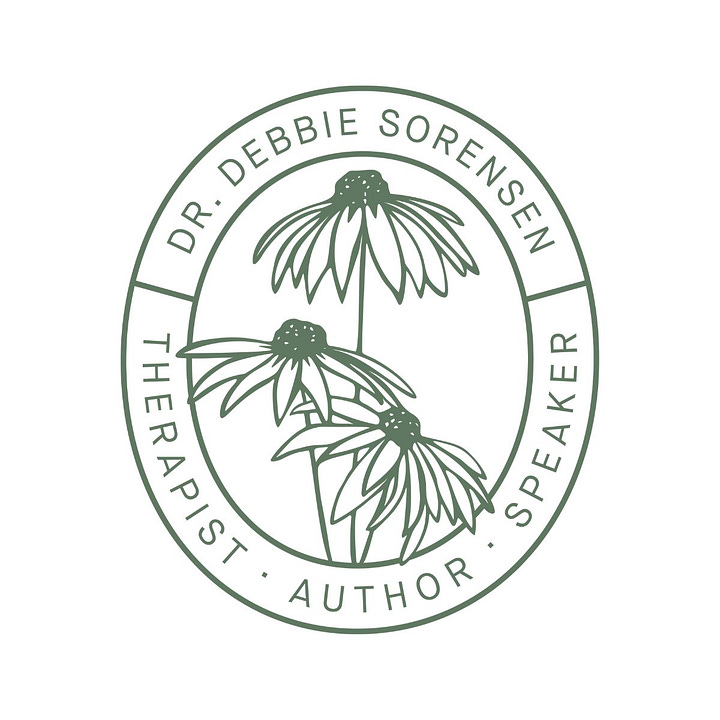Am I a Brand? (Part 1)
Ambivalence about marketing my business (as a therapist, writer, and small business owner)
A few weeks ago, I launched a new website!
I hired Maker + Made, a branding and creative agency in Spokane that was founded by two friends, Millie and Brittany. The Maker + Made team created new branding for me – a coordinated color palate, brand marks, logos, and fonts – and refreshed my stale old website into a more modern and beautiful one.
I love everything about my new website! The colors, the design, the way it’s organized, the beautiful wildflower theme that resonates strongly for me, forever a Colorado mountain girl at heart. I came up with the idea of using wildflowers while I was on a hike in the Colorado mountains last summer. It felt like a small revelation. I identify with those scrappy little flowers in the wild, growing in the rough mountains, blowing around in the mountain breeze. The branding Maker + Made created feels like “me” – casual, unfancy.


Until now, I’ve always made my own websites, using templates and some work. But I decided it was time for a professional upgrade.
I invested in a better website because I’m a small business owner - a clinical psychologist in private practice - and most people find their therapist online these days. I wanted my website to be “one stop shopping” to market my private practice, books, podcast, etc. I wanted people to find me online, and when they did, to get an accurate sense of me and my work.
To some degree, my business IS me.
My therapy practice is just me – with all my knowledge and clinical training and experience – sitting in a room with my clients. It’s deeply personal work. Therapists know that one of the key ingredients in the clinical outcome is the therapeutic relationship – the “fit” between client and therapist.
Therefore, my branding isn’t just about pretty colors and a beautiful website. It’s about conveying “me” online, so I can connect with clients for whom I would be a good fit as a therapist.
Which had me wondering… Am I a brand?
Am I a brand?
The idea that we are all our own personal brands has been popular for a while now. In a well-known 1997 Fast Company article, “The Brand Called You,” Tom Peters wrote that, “To be in business today, our most important job is to be head marketer for the brand called You.”
Peters wrote that, “When you’re promoting brand You, everything you do, and everything you choose not to do – communicates the value and character of the brand. Everything from the way you handle phone conversations to the email messages you send to the way you conduct business in a meeting is part of the larger message you’re sending about your brand.”
No pressure, right?
The idea of personal branding has been even more popular in recent years, in this age of social media influencers.
And there’s also been backlash against and criticism of the idea. Personal branding can feel inauthentic and performative, and most of us don’t especially want to commodify ourselves to make a buck.
I agree with these criticisms. Thinking of myself as a brand feels like it’s sapping away my humanity.
And yet… like it or not, there’s probably some truth to the idea that we are “brands,” in the sense that our behavior over time influences people’s impressions of us. People will make judgements about us and decide whether they consider us trustworthy. The way we portray ourselves, online and in real life, establishes our reputation.
The personal element is important in marketing. We care about the personal character of CEOs running major companies, and the ethics of companies we buy from. People and relationships matter for marketing – perhaps especially for small, local businesses.
As an example, my family has been going to the same neighborhood sushi restaurant for many years, in large part because of the woman who has been working there since before we moved into the neighborhood 15 years ago. She knows us, and we know her. We’re attached. To us, she’s the face of the business, a representation of the brand. But is she a brand? Or just a person doing her job, who we’ve gotten to know a little bit over the years.
That personal, face-to-face relationship with someone in the neighborhood is different than an online “personal brand” artificially created for marketing purposes.
I care deeply about personal connections, but am far more ambivalent about having an online personal brand. How can I represent myself in a way that captures my vibe, but doesn’t feel fake or gimmicky?
Promotophobia
When I was starting my private practice, I learned about marketing and creating an online presence. I had never learned much about marketing before, beyond a mention of it in an ethics and professional development class. If anything, I was given the implicit message that marketing was icky, could even be borderline unethical at times, for trying to manipulate people into buying things they don’t need, just to make a profit off them.
To get over the ick, I attended an online workshop specifically for therapists who have “promotophobia” – a fear of promoting ourselves.
The gist was that we (mental health professionals) have valuable expertise to share, and are in the business of helping people, but we don’t want to be self-promotional. We feel anxious about putting ourselves “out there.” And so, we often just don’t.
That workshop was ground-breaking for me, and I still think about it frequently. I’ve had a business, a podcast, blog, and books out for years, but continue to struggle with sharing publicly. I have a creative urge, and ideas for content I want to share, and I need to reach people if I want an audience. But I feel a deep sense of vulnerability when I share anything I’ve created. I’ve had to work on my fears of marketing and promoting my work.
Marketing-savvy people know that to have a strong brand, we need to connect with our followers/customers and develop trust and likeability. We need to carve out our niche, build an association with whatever we want to be known for, and occasionally reinvent ourselves so we don’t get stale. We need to keep creating new content all the time to feed the algorithm, so we can keep showing up on people’s feeds.
While I understand the rationale, doing all this feels exhausting to me. I notice a familiar internal conflict arising, between wanting to put my work out there in the world and wanting to hide.
Is there a middle ground? How can I promote my business ethically? How do I use marketing for good? How do I stay true to myself and my values? Should I be open and real, or maintain privacy by keeping personal aspects of myself off the internet? How can I create and share digestible content about psychology and mental health, with nuance and without dumbing down complex concepts?
And how about social media? Can I engage with social media in healthy ways, without being too consumed by it? Or should I disengage from social media completely?
My ambivalence has raised a lot of questions.
To be continued…
Stay tuned tomorrow for more exploration with “Part 2: Social Media and Me,” and the next day for “Part 3: Where I Landed.”
I’m a clinical psychologist, co-host of Psychologists Off the Clock, and author of the books ACT for Burnout and ACT Daily Journal. You can find me online at drdebbiesorensen.com.






I loved reading this and can resonate with most parts. I am also someone who hesitates a lot to put myself out there as a financial health planner and share financial management expertise. It gets exhausting when we feel we have to be performative to promote ourselves as a "personal brand" online. It feels superficial.
Recently I too attended a marketing workshop on how to sell financial advice as an expert and it was very enlightening for me. I am more comfortable now and know how to put myself out there without sounding too salesy. Hehe.
I relate to this so much! I’ve never heard the term “promotophobia” before but i definitely have it haha. I relate to the feeling of having a lot of creative ideas and thoughts to share but wanting to hide at the same time. I recognize that part of that is figuring out how vulnerable I want to be on the internet as a therapist. I’ve always been on the private, introverted side so navigating social media and an online presence has been a journey. I recently googled my name and noticed my Substack pops up and I cringe at the thought of people I know “in real life” finding me here 😅
I look forward to reading the next two parts to this Debbie!